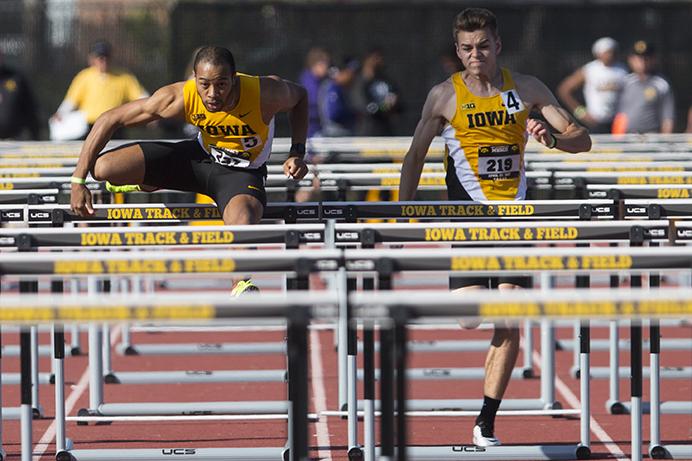By Carter Melrose
carter-melrose@uiowa.edu
Many say the there are two aspects to sport, physical and mental, and they are equally as vital to one’s success.
If anything over the last four years has held senior trackster Aaron Mallett back, it has been the latter. The deep valleys and tunnels encapsulated in the mind are dangerous to traverse and can spoil any athlete’s shining moment.
A prime example came during Mallett’s sophomore season at Drake Relays. He tripped over two things: his mind-space and the third hurdle.
When the first shoe dropped that day, it was in the form of heavy rain, putting Mallett on edge. Rain caused the next shoe to drop with amplified effects. Mallett lined up in his lane, attempting to center himself. As he looked to his left he noticed the other shoe entering into one of the prime-time neighboring lanes.
It was Omar McLeod, the second-best hurdler in the world and a soon-to- be gold medalist in the event.
“I lined up next to [McLeod] and let my nerves get the best of me,” Mallett said. “I psyched myself up to compete with him, when all I had to do was compete for myself.”
Fast forward to the 2017 Indoor NCAA Track and Field Championships. With great personal times floating in the air and expectations weighing him down, Mallett again hit the front side of an aluminum hurdle.
“I knew the expectations were high,” he said. “I think I placed unneeded pressure on me and instead of running the race like I know I could, I again tried to do stuff too fast, too quick. I ended up faltering in that race, too. I went from possibly winning to being last.”
At big moments in Mallett’s career, he has faltered in the face of high expectations, though he showed again and again that when he is able to make it over all his hurdles, he can leave most racers in the wake of his high-end speed.
This concept allowed Mallett to turn the corner mentally. He started to shift his perception in order to make the landscape of his mind work for him instead of the opposite. He transferred all his expectations into unrelenting confidence.
Expectations that plagued him in the past now serve as motivation and leadership; Mallett’s talent paired with this newfound swagger might one day be enough to psych-out some other young racers, causing them to hit the third hurdle.
“Hearing people say that I made a dynasty, I used to hear that about Andrew Riley and other great Big Ten hurdlers,” Mallett said. “Now, that is me who they are talking about.”
Mallett showcased this confidence this past week at home during the Musco Classic. With his experienced back against the wall, he ran the fourth-best 110-meter-hurdle time in the country, at his last home meet as a Hawkeye, heading into Drake Relays.
“[Mallett’s] ultimate goal is to win a flag this year,” said Joey Woody, the director of Iowa track and field. “He has all the tools to do it. He wants the victory lap.”
For Mallett, he craves a relays flag not only for his own personal gain but for one that can benefit the team.
“I just wanted to put Iowa on the map.” Mallett said. “From the way people have been talking, I have.”



